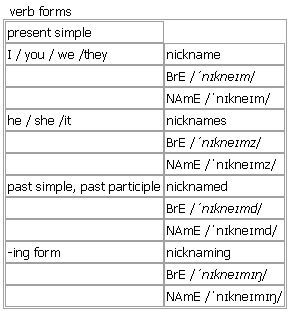|
Từ điển Oxford Advanced Learner 8th
 nickname
nickname

nick·name [nickname nicknames nicknamed nicknaming] noun, verb BrE [ˈnɪkneɪm] NAmE [ˈnɪkneɪm]
noun
an informal, often humorous, name for a person that is connected with their real name, their personality or appearance, or with sth they have done
Word Origin:
late Middle English: from an eke-name (eke meaning ‘addition’), misinterpreted, by wrong division, as a neke name.
Culture:
nicknames
Nicknames are informal, sometimes humorous names that are based on a person’s real name or on an obvious characteristic or habit. Nicknames were in use before ↑surnames became widespread in the 13th century and were a means of identifying a person. Some nicknames, such as ‚Russell’ meaning ‚red-haired’ and ‚Brown’ referring to brown hair or skin, later developed into surnames.
Nicknames reduce the level of formality in a relationship and may suggest a close friendship. Many people are given a nickname while they are still children and may keep it throughout their life, whether they like the name or not. Nicknames may also be given to politicians and other public figures, especially by the press, such as the name ‚Dubya’ often used for George W Bush. This makes famous people seem more ordinary, and also leads to shorter, eye-catching headlines.
There are several kinds of nickname in common use. The most popular are short forms, shortened versions of a person’s first name. Some common short forms include: Bob or Rob for Robert, Ted or Ed for Edward, Dick or Rick for Richard, Meg or Maggie for Margaret, Beth, Liz or Lizzie for Elizabeth, and Kathy, Kate or Katie for Katherine.
Nicknames may also be derived from surnames. Nicknames for famous people that have been much used by the British media include ‚Fergie’ for Alex Ferguson and ‘Becks’ for David Beckham. ‚Madge’ is used for the singer Madonna.
Other nicknames, like the original ones, reflect a personal characteristic. ‚Ginger’ is often used for people with red hair. ‚Shorty’, or even teasingly ‚Lofty’, is used for short people. Names like ‚Fatty’, ‚Tubby’ or ‚Skinny’ that refer to a person’s weight are rude and generally used only as insults. Nicknames based on skin colour are offensive and should not be used. ‚Brains’ is used for somebody who is very intelligent, and ‚Tiger’ for someone who is brave or aggressive. The Duke of Wellington is sometimes called ‚The Iron Duke’ and Margaret Thatcher was known as ‚The Iron Lady’ because of her strength and determination. These more descriptive nicknames are less common in the US.
Nicknames based on a person’s race or country can still be heard but are often highly offensive. In England, for instance, men from Scotland used to be addressed as ‚Jock’ or ‚Mac’, people from Ireland were ‚Paddy’ or ‚Mick’, and people from Wales ‚Dai’ or ‚Taffy’. Members of immigrant groups in both Britain and the US have had to suffer rude names from the native or mainstream population. Nicknames for people in foreign countries are also usually offensive, e.g. ‚Yanks’ or ‚Yankees’ for Americans, ‚Frogs’ for the French, and ‚Krauts’ for Germans.
The British have nicknames for many other things: a ‚Roller’ is a Rolls-Royce car and ‚Marks and Sparks’ is Marks and Spencers. ‚The Hammers’ and ‚Spurs’ are both football teams, West Ham United and ↑Tottenham Hotspur. In the US all states have nicknames: ↑California is ‚The Golden State’, ↑Texas is ‚The Lone Star State’, and ↑Wyoming is ‚The Equality State’.
Thesaurus:
nickname noun C
•We had nicknames for all our teachers.
pseudonym • • alias •
a nickname/pseudonym/alias for sb
use/adopt a/an nickname/pseudonym/alias
Example Bank:
•He got his nickname ‘Ash’ from his heavy smoking.
•He got his nickname when he was at school and it stuck for the rest of his life.
•He used the nickname ‘Brutus’.
•He worked in a garage— hence his nickname ‘Oily’.
•Knockout Nat lived up to his nickname.
•Leicester Tigers lived up to their nickname in a very attacking game.
•Their nickname for the club was ‘Muscle Alley’.
•His scruffy hair earned him the nickname ‘Shaggy’.
•How did you get your nickname?
•We used to have nicknames for all our teachers.
verb often passive ~ sb/sth + noun
to give a ↑nickname to sb/sth
•She was nicknamed ‘The Ice Queen’.
Verb forms: 
Word Origin:
late Middle English: from an eke-name (eke meaning ‘addition’), misinterpreted, by wrong division, as a neke name.
Example Bank:
•He was nicknamed ‘Stretch’ because he was so tall.
•His family kept bees, so we nicknamed him ‘Buzz’.
•Michael Jackson, nicknamed ‘Jacko’
|
|
|
▼ Từ liên quan / Related words
|
|
